
Gymnothorax is a genus of fish in the family Muraenidae found in Atlantic, Indian and Pacific Ocean. With more than 120 species, it the most speciose genus of moray eels.
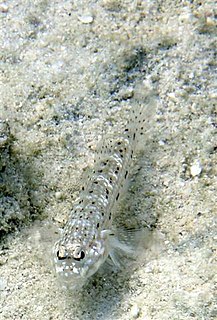
Fusigobius is a genus of coral reef inhabiting gobies found throughout the Indian and western Pacific Oceans.
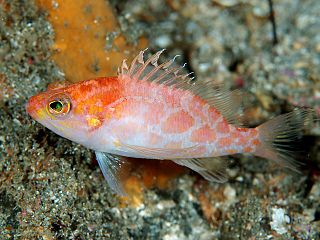
Plectranthias is a genus of ray-finned fish in the subfamily Anthiinae, part of the family Serranidae, the groupers and sea basses. They are found in the Atlantic, Indian and Pacific Ocean.

Synodus is a genus of fish in the family Synodontidae found in Atlantic, Indian and Pacific Ocean.

Pseudochromis is a genus of fish in the family Pseudochromidae found in Indian and Pacific Ocean.

Amblyeleotris is a genus of fish in the family Gobiidae found throughout the Indo-Pacific region. This is the largest genus of the shrimp gobies or prawn gobies, so-called because of their symbiotic relationship with certain alpheid shrimps. The shrimp excavates and maintains a burrow used by both animals while the goby, which has far superior eyesight, acts as a lookout for predators. The shrimp maintains almost constant contact with the fish with an antenna. These species vary considerably in size from less than 30 mm to almost 200 mm standard length.

Ctenogobiops tangaroai, the Tangaroan shrimp-goby, is a species of goby of the family Gobiidae, native to the reefs of the Pacific Ocean where it can be found in fine-grained sand patches at depths of from 4 to 40 metres. This species is commensal with alpheid shrimps, with a fish and shrimp sharing a burrow. This species can reach a length of 6 centimetres (2.4 in) TL. It can also be found in the aquarium trade.

Rhinogobius is a genus of primarily freshwater gobies native to tropical and temperate parts of eastern Asia. Most are small, streamlined in shape, and often sexually dimorphic. Few are of commercial importance, but R. duospilus is fairly widely traded as an aquarium fish.

Mugilogobius is a genus of fish in the family Gobiidae. They are found in fresh, brackish and marine water of the Indo-Pacific region. Several of the freshwater species have highly restricted distributions.
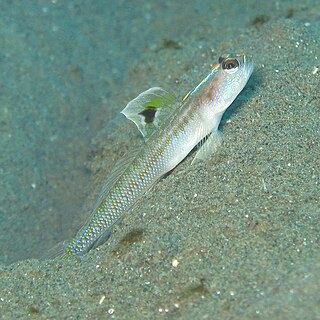
Vanderhorstia is a genus of gobies native to the Indian and Pacific oceans. The name of this genus honours the Dutch biologist Cornelius van der Horst (1889-1951) of the University of The Witwatersrand, Johannesburg, who was well known for his interest in marine biology.

Tomiyamichthys is a genus of gobies found from the Red Sea through the Indian Ocean to the western Pacific Ocean. The name of this genus honours the Japanese ichthyologist Itiro Tomiyama of the Tokyo Imperial University, who described the type species, Tomiyamichthys oni, in 1936.
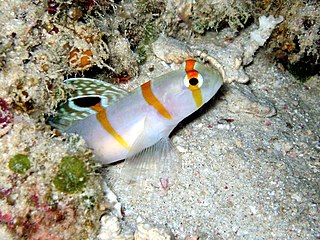
Amblyeleotris randalli, Randall's prawn goby, is a marine benthic species of goby native to tropical reefs of the central Indo-Pacific. This species can also be found in the aquarium trade.
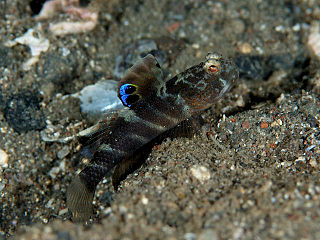
Mahidolia mystacina, the flagfin prawn goby, flagfin shrimpgoby or smiling goby, is a species of goby native to the Indian Ocean and the Pacific Ocean from Delagoa Bay, Mozambique to the Society Islands and from southern Japan to Samoa and northern Australia. This species occurs in marine and brackish waters, being found in coastal bays, estuaries and reef bases where the bottom is silty or muddy at depths of from 5 to 25 metres. This species is a commensal with a species of alpheid shrimp, using its burrow as its home. This species can reach a length of 8 centimetres (3.1 in) TL. This species can also be found in the aquarium trade. It is currently the only known member of its genus.

Cryptocentrus also known as Watchman gobies, and one of the genera known as shrimp gobies or prawn gobies, is a genus of gobies native to tropical marine waters of the Indian and Pacific oceans.

Parapercis is a genus of sandperches belonging to the fish family Pinguipedidae.

Callogobius is a genus of fish in the family Gobiidae found in brackish and marine waters of the Indian and Pacific Ocean.
Discordipinna is a genus of gobies native to the Indian Ocean and the western Pacific Ocean.
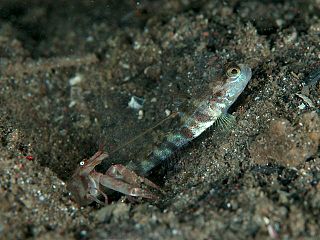
Myersina is a genus of ray-finned fish from the family Gobiidae, the true gobies which are found from the Atlantic coast of South Africa through the Indian Ocean to the western Pacific Ocean. The generic name honours the American ichthyologist George S. Myers (1905-1985) who was a younger colleague of Herre's at the time at which he described the genus and who went on to be president of the American Society of Ichthyologists and Herpetologists, the head of the Division of Fishes at the United States National Museum and an ichthyologist for the United States Fish and Wildlife Service.

Pseudogobius is a genus of fish in the goby family, Gobiidae. It is widely distributed in tropical and temperate regions of the Indian and western Pacific Oceans. Species occur in freshwater and estuarine habitat types, such as mangroves and seagrass beds.
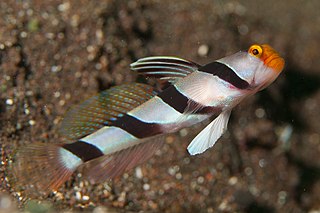
Stonogobiops is a genus of gobies native to the Indian and Pacific oceans. This is one of the "shrimp goby" genera, the members of these genera being commensal with various species of shrimps.



















